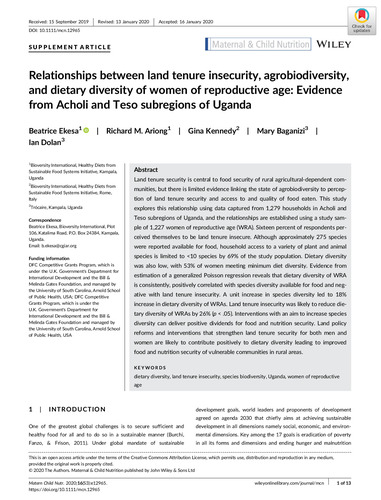Relationships between land tenure insecurity, agrobiodiversity, and dietary diversity of women of reproductive age: Evidence from Acholi and Teso subregions of Uganda
Land tenure security is central to food security of rural agricultural-dependent communities, but there is limited evidence linking the state of agrobiodiversity to perception of land tenure security and access to and quality of food eaten. This study explores this relationship using data captured from 1,279 households in Acholi and Teso subregions of Uganda, and the relationships are established using a study sample of 1,227 women of reproductive age (WRA). Sixteen percent of respondents perceived themselves to be land tenure insecure. Although approximately 275 species were reported available for food, household access to a variety of plant and animal species is limited to <10 species by 69% of the study population. Dietary diversity was also low, with 53% of women meeting minimum diet diversity. Evidence from estimation of a generalized Poisson regression reveals that dietary diversity of WRA is consistently, positively correlated with species diversity available for food and negative with land tenure insecurity. A unit increase in species diversity led to 18% increase in dietary diversity of WRAs. Land tenure insecurity was likely to reduce dietary diversity of WRAs by 26% (p < .05). Interventions with an aim to increase species diversity can deliver positive dividends for food and nutrition security. Land policy reforms and interventions that strengthen land tenure security for both men and women are likely to contribute positively to dietary diversity leading to improved food and nutrition security of vulnerable communities in rural areas.

